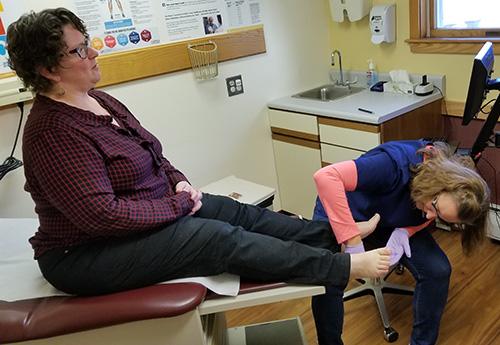
DFD Russell Medical Centers is a HRSA Health Center Program grantee, which serves more than 6,500 patients at three health center sites in rural Maine. Most of their patients are over the age 40, which means most patients have an increased risk of diabetes. DFD cares for patients with diabetes by tracking patient data such as HbA1c, foot evaluations, and diabetic eye exams in monthly clinician reports. DFD was designated as a 2018 HRSA Diabetes Leader.
To provide more support for patients with diabetes, DFD relies on collaboration with community organizations. Care managers connect patients with these resources to improve their adherence to their diabetes management plan and improve overall outcomes. Some of the partnerships include:
- Living Well Diabetes group, which offers peer-to-peer group classes.
- SNAP-ED: Cooking Matters class, which includes a perimeter walk-through of a grocery store to learn how to read a food label and identify healthy choices. The program incentivizes participants with a gift certificate.
- Seniors Plus, a partnership supported by a community grant, provides classes for the geriatric population at the health center.
- Farmer’s markets that accept Electronic Benefit Transfer (EBT) cards to promote eating local and fresh food.
- Lion’s Club offers diabetic eye exams and glasses for uninsured patients.
- Rural Community Action of Maine provides transportation for patients through a volunteer drivers’ program.
- A pre-diabetes, healthy living class taught by a certified peer educator.
How to Implement
DFD recommends the following actions to develop community partnerships to manage diabetes:
- Engage the entire health center staff consistently using anecdotal and data-driven evidence to show how partnerships benefit patients. The goal is for every provider to promote community partnership resources to all patients with diabetes.
- Identify a champion to move the partnerships forward and to serve as a liaison between the health center staff and the partner organization. A single point of contact for each partnership is key.
- Consider using a competition with incentives to encourage providers to refer patients to partner programs. DFD collects data on patient referrals, and the provider team with the most referrals wins a free lunch.
- Plan how to promote partner programs directly to patients. DFD uses monthly newsletters, a marketing campaign, and social media.
- Monitor referrals from health center providers, and ask the partner organizations to collect data on their program. Request participation data and evaluations of the program content or activity.
- Research funding opportunities that require collaboration that could benefit both organizations, and consider applying together.

